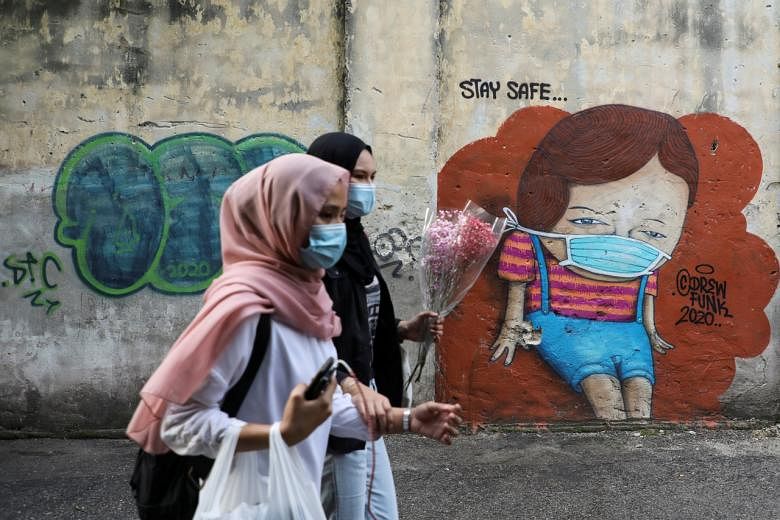PETALING JAYA (THE STAR/ASIA NEWS NETWORK) - Malaysia had the highest Covid-19 reproduction number (Rt) of 1.57 on Sept 15 among six other countries in the region, according to a disease modelling centre based in Britain.
The Centre for Mathematical Modelling of Infectious Diseases on its "Epiforecasts" website estimated that Malaysia's Covid-19 reproduction number on Sept 15 was at 1.57, followed by Singapore at 1.15, Thailand at 1.1, Indonesia at 1.06 and Philippines at 1.0.
Two countries which recorded a Covid-19 reproduction rate of below 1.0 were Vietnam at 0.61 and Cambodia at 0.49.
However, data for Myanmar, Brunei and Laos were not available.
The reproduction number is the rate of infectivity and estimates the average number of people that one positive Covid-19 patient can infect.
"Our modelling framework, based on open source tooling, accounts for uncertain reporting delays so that the reproduction number is estimated based on underlying latent infections and not reported cases or deaths," said its website.
The centre, which is located at the London School of Hygiene and Tropical Medicine, claims to be a multidisciplinary grouping of epidemiologists, mathematicians, economists, statisticians and clinicians.
While the centre's estimation at 1.57 on Sept 15 for Malaysia was close to the Health Ministry's figure of 1.58 on Sept 13, it did not explain why this was higher than the infectivity rates in Indonesia, Singapore and the Philippines which have a far higher number of cases.
Other countries badly hit by the pandemic such as Britain - which has a total of 390,358 cases - also had a slightly lower reading than Malaysia.
Malaysia's Rt peaked at 2.34 on Sept 8 and at 2.30 on Sept 11.
Health director-general Dr Noor Hisham Abdullah previously cautioned that it was crucial to keep the Rt to below 1.60 to avoid a new wave of Covid-19 infections in the country.
Last week, he noted the need to strike a balance between protecting lives and livelihoods.
"We should not repeat another lockdown as seen in other countries. Our Rt is alarming," he tweeted.
On Sept 18, the British government stated on its official website that the Rt in the country was estimated to be between 1.1 and 1.4, with the number of new infections growing by 2 per cent to 7 per cent every day.
"An R number of between 1.1 and 1.4 means that on an average, every 10 people infected will infect between 11 and 14 other people," it said, pointing out that there was widespread growth of the epidemic across the country.
According to the Daily Mail, the R value for Britain estimated by the Imperial College Covid-19 Response Team was at 2.4 before lockdown started.
"But some experts analysing outbreaks across the world have estimated that this could be closer to the 6.6 mark.
"Estimates of the R number vary because the true size of the pandemic remains a mystery, and how fast the virus spreads depends on the environment," it said.
The virus will spread faster in densely populated cities with public transportation as a main method of commuting.
Asked why Malaysia recorded a higher Rt compared to other countries that recorded much higher cases in the region, Medical Practitioners Coalition Association of Malaysia president Dr M. Raj Kumar said the number was not fixed.
"Instead, it changes as our behaviour changes or as immunity develops. Rt does not depend on the number of cases in the country but how many other people can get infected from one infected case," he said.
Universiti Malaya epidemiologist Prof Dr Awang Bulgiba Awang Mahmud said while the R value was an important indicator of whether a country was safe from Covid-19, it was not the only one.
"Other indicators include the country's capacity to cope with the disease, and the trend in the number of new cases and discharged individuals in comparison with the number of new infections," he said.
An Rt value - the effective reproduction number - of less than 1.0 is a good sign. While R0, or R-naught, is the initial reproduction number of the virus at the beginning of the pandemic, Rt refers to the reproduction number at a particular point in time.
"An Rt of less than 1.0 means that the number of people being infected on average will get fewer over time and if this situation persists, the disease will eventually die out. Any Rt above 1.0 means the virus is spreading fast," said Prof Awang.
An Rt of 1.0, he said, meant that a disease was endemic and would persist over time, such as dengue.
Universiti Putra Malaysia medical epidemiologist Associate Professor Malina Osman said it was tricky to compare the R value of Covid-19 with previous infectious disease outbreaks in the country, such as the severe acute respiratory syndrome (Sars) in 2003 and the Influenza A (H1N1) in 2009.
"In the local context, there is no documented evidence about the R value for Sars and H1N1 as there were not many cases for both diseases in Malaysia at that time.
"However, studies done during the Sars outbreak with data from Hong Kong and Singapore showed that the R value ranged from 2.2 to 3.6. For H1N1, the R value documented in various studies ranged from 4.0 to 4.5," she said.
While the Rt value was a good indicator of the transmissibility of the virus, Assoc Prof Malina said caution must be applied when interpreting the R value as this provided a generalised picture of an entire country.
"The R value is an estimated index for the whole country. So, the value may be over- or under-estimated for specific districts and areas. Counting the Rt value is a complex procedure. It depends on the type of transmission and the mathematical models used, the epidemiological data, population structure and intrinsic growth rate," she said.
Other factors such as disease prevention policies and public compliance were important to determine whether the virus remained a threat to the country, said Assoc Prof Malina.











